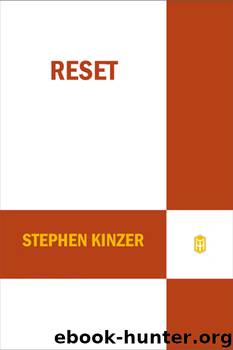Reset by Stephen Kinzer

Author:Stephen Kinzer [Kinzer, Stephen]
Language: eng
Format: epub, mobi
ISBN: 978-1-4299-4828-9
Publisher: Henry Holt and Co.
Published: 2010-09-22T04:00:00+00:00
In the years after 1980, both the Turks and the Iranians became disillusioned with their authoritarian regimes. They sought a way back to democracy. The Turks found one; the Iranians did not. Why?
The institutions Atatürk and his comrades built proved more flexible, and therefore more durable, than those Reza Shah built. Turkey’s democratic system responds, albeit slowly and clumsily, to the people’s will. It evolves along with the zeitgeist. Atatürk did not give Turks democracy, but he created conditions that allowed democracy to emerge after his death.
“I am leaving behind no sermon, no dogma, nor am leaving as my legacy any commandment that is frozen in time or cast in stone,” the Gazi said as his strength began to fade. “Concepts of well-being for countries, for peoples and for individuals, are changing. In such a world, to argue for rules that never change would be to deny the reality found in scientific knowledge and reasoned judgment.”
Here lies the key to Turkey’s success as a nation. It has proven able to change with the times. Turkey was founded as an authoritarian state at a time when the authoritarian idea was ascendant. When democracy became the new global faith after World War II, Turkey moved peacefully from one-party to multiparty rule. When the world began using human rights as a measuring stick for nations, Turkey gave its citizens more rights. When many Turks decided they wanted more freedom of religion, the political system gave them a way to express themselves peacefully, and ultimately to elect their champion to lead the country.
In Iran, the opposite happened. Pahlavi absolutism suffocated the natural development of democracy. This produced the explosion that led to Iran’s present conundrum.
While Atatürk built institutions, Reza became obsessed with family power. Above all he wanted to assure a clear path to the throne for his son. This made it impossible for him to promote democracy, which rejects hereditary power.
Some American historians believe the United States was fortunate that George Washington had no children, because given the power of the monarchical idea in his time, there might otherwise have been pressure to establish a dynasty. The same might be said for Atatürk. He had no child who might rule Turkey after he was gone. Partly for that reason, he was free to hope that the Turks might one day rule themselves.
Another factor also helps explain the different modern fates of Turkey and Iran: foreign intervention. Midway through the twentieth century, both countries were on the way toward real self-rule. Turkey held its first multiparty election, from which the homespun populist Adnan Menderes emerged. In Iran, the democratic hero Mohammad Mossadegh was elected prime minister. The path to full democracy in both nations seemed clear. What threw Iran offtrack was foreign intervention.
The passionate desire to modernize that drove Atatürk and Reza Shah was the key to their triumphs, but it had a dark side. Both men hated tradition, whether social, religious, civic, or cultural. Both believed there was only one worthy civilization on
Download
This site does not store any files on its server. We only index and link to content provided by other sites. Please contact the content providers to delete copyright contents if any and email us, we'll remove relevant links or contents immediately.
| Anthropology | Archaeology |
| Philosophy | Politics & Government |
| Social Sciences | Sociology |
| Women's Studies |
The Secret History by Donna Tartt(19061)
The Social Justice Warrior Handbook by Lisa De Pasquale(12188)
Thirteen Reasons Why by Jay Asher(8896)
This Is How You Lose Her by Junot Diaz(6878)
Weapons of Math Destruction by Cathy O'Neil(6268)
Zero to One by Peter Thiel(5790)
Beartown by Fredrik Backman(5739)
The Myth of the Strong Leader by Archie Brown(5502)
The Fire Next Time by James Baldwin(5433)
How Democracies Die by Steven Levitsky & Daniel Ziblatt(5217)
Promise Me, Dad by Joe Biden(5147)
Stone's Rules by Roger Stone(5082)
A Higher Loyalty: Truth, Lies, and Leadership by James Comey(4955)
100 Deadly Skills by Clint Emerson(4921)
Rise and Kill First by Ronen Bergman(4781)
Secrecy World by Jake Bernstein(4744)
The David Icke Guide to the Global Conspiracy (and how to end it) by David Icke(4710)
The Farm by Tom Rob Smith(4503)
The Doomsday Machine by Daniel Ellsberg(4486)
